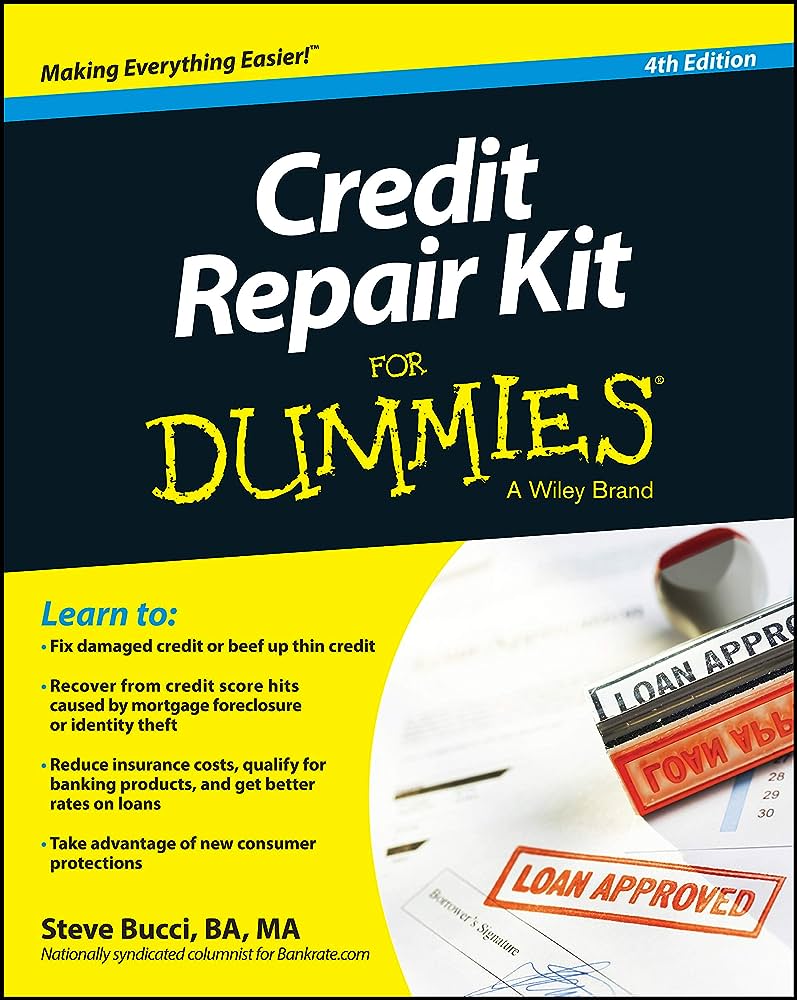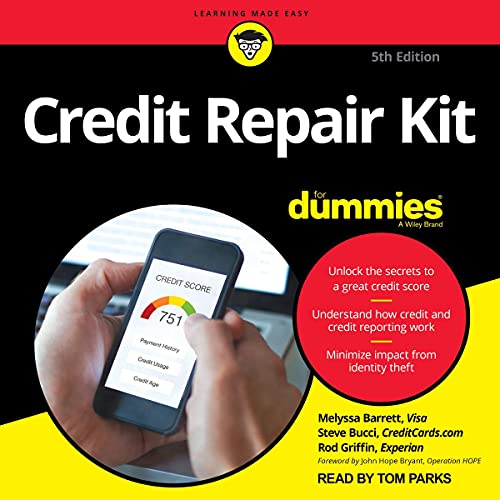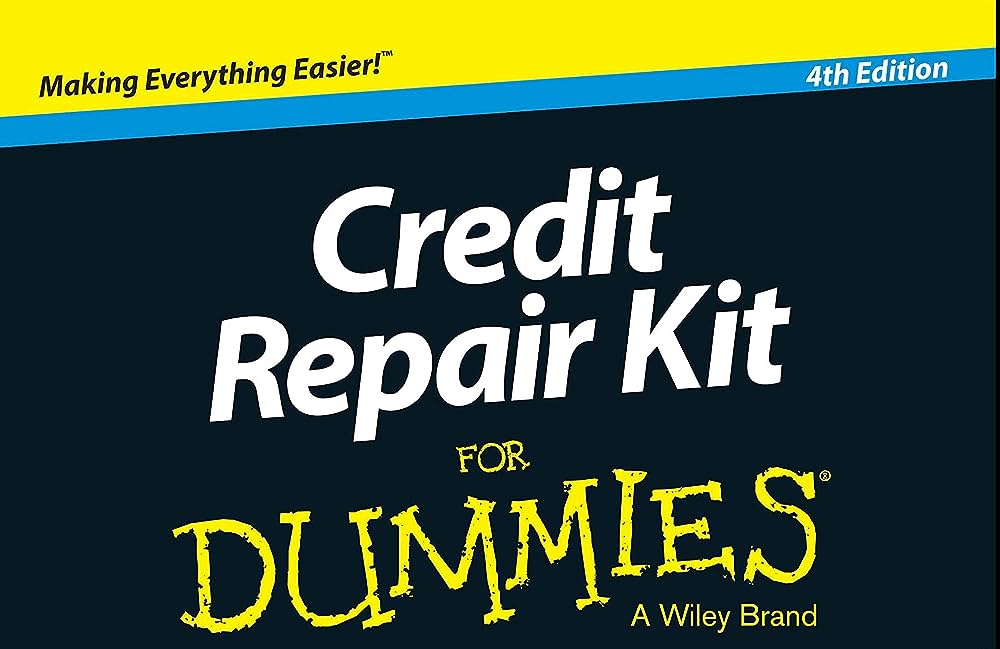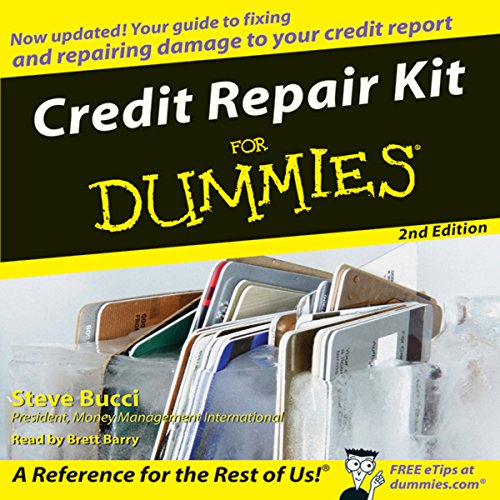So, you’ve found yourself in a bit of a credit mess, huh? Don’t worry, you’re not alone. Many people have faced the frustration of dealing with poor credit scores and the consequences that come with it. But fear not, “Credit Repair For Dummies” is here to lend you a helping hand. In this article, we’ll break down the essential steps to repairing your credit and getting back on track. From understanding your credit report to developing a solid repayment plan, we’ve got you covered. Let’s get started on the road to financial freedom!

Understanding Credit Repair
What is Credit Repair?
Credit repair is the process of improving your creditworthiness and repairing any negative aspects of your credit history. It involves taking steps to fix errors on your credit reports, addressing outstanding debts, and implementing strategies to rebuild your credit.
Why is Credit Repair Important?
Having good credit is crucial for various financial transactions and opportunities in life. It affects your ability to get approved for loans, credit cards, or even find employment. Credit repair is important because it allows you to rectify any issues that may be dragging down your credit scores and improve your financial standing.
How Does Credit Repair Work?
Credit repair works by identifying errors and inaccuracies on your credit reports, disputing these errors with credit bureaus, and taking steps to improve your credit behaviors. The ultimate goal is to remove inaccuracies, resolve outstanding debts, and establish positive credit habits that will boost your creditworthiness over time.
Assessing Your Credit Score
What is a Credit Score?
Your credit score is a three-digit number that represents your creditworthiness. It is a numerical assessment of your credit history, indicating how likely you are to repay borrowed money. Credit scores range from 300 to 850, with higher numbers indicating better creditworthiness.
How is a Credit Score Calculated?
Credit scores are calculated using various factors, including your payment history, amounts owed, length of credit history, credit mix, and new credit. Each factor carries a different weight in determining your credit score. Payment history, for example, contributes significantly to your credit score, so it’s important to make timely payments on all your credit accounts.
Where Can You Access Your Credit Score?
There are several ways to access your credit score. You can obtain it directly from credit bureaus, credit card issuers, or through various online services. Some financial institutions and credit card companies also provide free access to credit scores as part of their customer benefits.
Identifying Credit Report Errors
Importance of Reviewing Your Credit Reports Regularly
Reviewing your credit reports regularly is essential to identify any errors, inaccuracies, or fraudulent activity that may negatively impact your credit. By reviewing your reports, you can ensure the information is accurate, up-to-date, and reflects your credit history correctly.
Common Credit Report Errors to Look for
Some common credit report errors include incorrect personal information, accounts mistakenly listed as open or closed, late payments that were not late, and accounts that do not belong to you. It’s important to scrutinize every detail on your credit reports to catch any errors that may harm your creditworthiness.
How to Dispute Credit Report Errors
If you find errors on your credit reports, you have the right to dispute them. Start by gathering supporting documentation, such as payment receipts or account statements, to prove the inaccuracies. Then, contact the credit bureaus in writing to initiate the dispute process. They are required to investigate and correct any errors within a certain timeframe.
Developing a Credit Repair Plan
Setting Realistic Goals
When developing a credit repair plan, it’s important to set realistic goals. Understand that rebuilding credit takes time and effort, and it’s unlikely to happen overnight. Set achievable goals, such as improving your credit score by a certain number of points or paying off specific debts within a reasonable timeframe.
Creating a Budget and Payment Plan
A crucial part of your credit repair plan is creating a budget and payment plan. Start by evaluating your income and expenses to determine how much you can allocate towards debt repayment. Then, prioritize your debts based on interest rates and balances. Create a payment plan that allows you to make regular, on-time payments to reduce your debt and improve your credit.
Prioritizing Debts and Payments
Not all debts are created equal, and prioritizing your payments can have a significant impact on your credit repair journey. Focus on high-interest debts first, as they can accumulate more interest over time. Paying off these debts will save you money in the long run and help improve your credit utilization ratio.

Managing Outstanding Debts
Understanding the Different Types of Debts
It’s important to understand the different types of debts when managing outstanding obligations. Secured debts, such as mortgages or auto loans, are backed by collateral and carry different considerations than unsecured debts, like credit card debt. Additionally, you may have revolving debts, such as credit cards, or installment debts, such as personal loans.
Strategies for Paying Off Debts
There are various strategies you can employ to pay off your debts efficiently. Two popular methods are the snowball method and the avalanche method. The snowball method involves paying off the smallest debts first while making minimum payments on larger debts. The avalanche method focuses on paying off debts with the highest interest rates first, saving you money on interest over time.
Negotiating with Creditors and Collection Agencies
If you’re struggling to repay your debts, it’s worth considering negotiating with your creditors or collection agencies. They may be willing to work out a payment plan, reduce interest rates, or settle the debt for less than the full amount. Communication and transparency are key when negotiating with creditors, as they want to see your commitment to resolving the debt.
Building Positive Credit History
Importance of On-Time Payments
One of the most crucial factors in building positive credit history is making on-time payments. Late payments can significantly impact your credit score and stay on your credit reports for up to seven years. Prioritize making all payments on time, even if it means setting up reminders or automatic payments to ensure you don’t miss any deadlines.
Diversifying Credit Accounts
Having a diverse mix of credit accounts can positively impact your credit score. It shows lenders that you can handle different types of credit responsibly. Consider diversifying your credit mix by having a combination of credit cards, installment loans, and mortgages, as long as you can manage them effectively.
Establishing Secured Credit
If you’re struggling to obtain credit due to a poor credit history, consider establishing secured credit. Secured credit cards or loans require a security deposit or collateral, providing lenders with reassurance in case you default on payments. By responsibly managing secured credit, you can rebuild your creditworthiness over time.

Dealing with Collection Accounts
Understanding Collection Accounts
Collection accounts are debts that have been sent to collection agencies after a period of non-payment. They can have a significant negative impact on your credit score and remain on your credit reports for up to seven years. It’s important to address collection accounts promptly to minimize their impact on your creditworthiness.
Options for Resolving Collection Accounts
There are several options for resolving collection accounts. You can negotiate a debt settlement, where you agree to pay a portion of the debt in exchange for the collection agency closing the account and reporting it as “paid” or “settled” on your credit reports. Another option is paying the debt in full, which will remove the collection account entirely from your credit reports.
Negotiating Debt Settlements
Negotiating debt settlements with collection agencies can be challenging, but it’s worth exploring if you’re unable to pay the full amount. It’s important to negotiate from a position of knowledge, understanding the fair market value of the debt and being prepared to make a reasonable settlement offer. Get all settlement agreements in writing and ensure they clearly state the terms of the agreement.
Understanding Credit Repair Services
What are Credit Repair Services?
Credit repair services are companies that offer to help individuals improve their credit. They usually offer services such as credit report analysis, dispute preparation, and negotiation with creditors or collection agencies. Credit repair services aim to assist individuals in removing inaccuracies, resolving debts, and rebuilding their credit history.
Benefits and Limitations of Credit Repair Services
Credit repair services can provide expertise and alleviate the hassle of dealing with credit problems on your own. They have experience in navigating the credit repair process and may have relationships with creditors and collection agencies. However, it’s important to note that credit repair services cannot guarantee specific outcomes or remove accurate, negative information from your credit reports.
Choosing a Reputable Credit Repair Company
When choosing a credit repair company, it’s important to do thorough research. Look for companies with a strong reputation, positive customer reviews, and transparent pricing structures. Avoid companies that make unrealistic promises or require upfront payment before providing any services. Additionally, consider consulting with a credit counselor or financial advisor to help you make an informed decision.

Maintaining Good Credit Habits
Regularly Monitoring Your Credit
Even after you’ve gone through the credit repair process, it’s crucial to regularly monitor your credit reports for any new errors or discrepancies. Obtain your credit reports at least once a year from each of the three major credit bureaus and review them carefully. Monitoring your credit allows you to catch any issues early and take appropriate action.
Avoiding Excessive Credit Inquiries
Excessive credit inquiries can negatively impact your credit, so it’s important to be mindful of how often you apply for new credit. Each time you apply for credit, a hard inquiry is placed on your credit report, which can temporarily lower your credit score. Only apply for credit when necessary and be selective to minimize the impact on your credit.
Maintaining Low Credit Utilization
Credit utilization, or the ratio of your credit card balances to your credit limits, plays a crucial role in your credit score. Aim to keep your credit utilization below 30% to maintain a healthy credit profile. Pay off credit card balances in full each month, avoid maxing out cards, and consider increasing your credit limits to improve your credit utilization ratio.
Rebuilding Credit After Bankruptcy
Understanding Bankruptcy and Credit
Bankruptcy is a legal process that allows individuals or businesses to eliminate or restructure their debts. While bankruptcy can provide relief for those overwhelmed with debt, it also has a significant impact on credit. Bankruptcies can stay on credit reports for up to ten years, making it challenging to obtain new credit in the immediate aftermath.
Steps to Rebuild Credit After Bankruptcy
Rebuilding credit after bankruptcy requires patience and persistence. Start by reviewing your credit reports for any errors or inaccuracies related to the bankruptcy. Then, focus on the fundamental building blocks of good credit, such as making on-time payments, keeping credit utilization low, and diversifying your credit accounts. Over time, positive credit behaviors will help rebuild your creditworthiness.
Patience and Persistence in Rebuilding Credit
Rebuilding credit after bankruptcy is a journey that requires patience and persistence. It takes time to rebuild trust with lenders and demonstrate responsible financial behaviors. Stay committed to making on-time payments, avoiding excessive debt, and maintaining a positive credit history. Remember that rebuilding credit is a gradual process, but with determination, you can improve your financial standing over time.
In conclusion, credit repair requires a comprehensive approach that involves understanding your credit score, identifying errors on your credit reports, developing a repair plan, and implementing positive credit habits. It’s essential to prioritize paying off debts, diversify your credit accounts, and maintain good financial practices to rebuild your creditworthiness. While credit repair services can offer assistance, it’s crucial to choose reputable companies and stay vigilant in monitoring your credit. Rebuilding credit takes time, but with patience and persistence, you can achieve financial stability and improve your credit standing.

